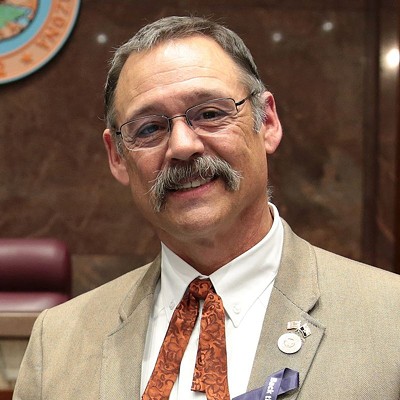Carroll, the Republican supervisor from District 4, isn't the only actor. There's fellow Republican Ann Day of District 1, and the trio of Democratic supervisors who make up the majority: Ramón Valadez of District 2, Sharon Bronson of District 3, and Chairman Richard Elías of District 5.
As part of his starring role, each April, Carroll presents an alternative to County Administrator Chuck Huckelberry's county-budget draft.
This results in often volatile discussions about taxes and the county's spending. In 2007, the discussion included a debate on a half-cent county sales-tax increase proposed by Huckelberry (to raise money to allow for a decrease in property taxes, Huckelberry said), which was blocked by Carroll.
However, that argument paled in comparison to this year's debate, when the supervisors and Huckelberry were looking at a $24 million deficit due to the moribund economy. Huckelberry required county department heads to submit budgets with up to a 7 percent cut, and to also prepare for possible layoffs.
Another possible reason for this year's budget-banter drama: It's an election year, and three of Carroll's fellow supervisors are facing opposition.
At public hearings on the budget in May and June, Carroll grilled department heads on budgets and staffing, and questioned the amount of county dollars going to programs like Las Artes, which helps local residents complete GEDs and get additional employment skills.
This year, Day also signed on to Carroll's alternative budget; Day and Carroll have both said that Huckelberry visited Day's office, clearly upset that she was now part of Carroll's opposition. Meanwhile, other supervisors looked visibly tired during Carroll's questioning at meetings, occasionally rolling their eyes in response to the ideas that Carroll continued to bring to the table.
The budget discussions, which forced the meetings to run much longer than usual, served as proof to some county observers that the tensions between Huckelberry and Carroll have exploded into a full-blown rivalry.
The term "r ivalry" seemed particularly appropriate this spring, considering a slew of questions sent out to all department heads by Carroll and his executive assistant, Scott Egan.
For the most part, department heads responded--until Huckelberry asked them in May to stop, claiming the barrage of questions required too much research to answer. Huckelberry claimed the demands on staff time were unfair unless a majority of supervisors made the requests.
Any talk of a rivalry, however, makes Huckelberry uncomfortable. Instead, he attributes the head-butting to pure politics, a process that gets especially difficult when you mix an election year with a difficult budget and economy.
Carroll, however, is all smiles at the word "rivalry," saying it's quite possibly the best term to describe the relationship he has with Huckelberry. He also says the fact that 2008 is an election year is irrelevant.
"It comes up every year--and every year isn't an election year, unless you count the elections of foreign nations. (Huckelberry) is in his own world, I believe, and he's not accountable. It is not an election-year ploy. It is not to divide any constituency from their supervisor or create more bureaucracy from my office. My questions about the budget are legitimate, and my concerns about the county and how it is run are legitimate," Carroll says.
In response to Carroll's specific questions about the 2008-2009 budget, Huckelberry sent out a 13-page memorandum with more than 70 pages of attachments on May 30. In response, Carroll sent out his own 9-page memorandum on June 16 to counter each of the 24 discussion issues that began when the supervisors first met to discuss the budget publicly.
Additional discussions at the board level, however, didn't really matter at that point: The next day, on June 17, the 2008-2009 budget passed, with the three Democrats voting yes, and Day and Carroll voting no.
Carroll did get in the last word, by criticizing the budget process and the fact that only limited information was made available to the public and the supervisors at the beginning of the budget hearings.
Huckelberry responded by putting budget information and other correspondence going back to 2007 on the county's Web site at www.pima.gov. Carroll then nipped back that it would have been nice for the county to publish the budget in the dailies, too, just like the city of Tucson does.
Huckelberry sighs.
"We're so transparent now, they can see our underwear," he says, talking not only about the budget, but also about the election-integrity issues brought up by the Pima County Democratic Party's public-records request and lawsuit for election database files, following allegations that the 2006 Regional Transportation Authority election may have been flipped.
Carroll's June 16 memorandum also brought up complaints regarding the treatment he receives from Huckelberry and the Democratic majority, thanks to his maverick ways. He claims that requests for his District 4 constituents are not addressed properly; as an example, the Green Valley Coordinating Council's request for additional funds for measles immunizations this last budget season went nowhere.
However, from Huckelberry's perspective, this year's budget left little room for any expansion of services.
Other issues raised during the memo exchange involved the Service Employees International Union, which represents county employees, and its request for pay raises; the county's use of lobbyists; the costs of animal care; the county's costly State of the County luncheon; and the county's continued financial support of the cash-strapped Kino Hospital.
Carroll says he never regrets the way he approaches the budget or the way he questions Huckelberry and county staff. At the heart of the dispute, says Carroll, is the fact that the three Democrats on the board rarely question Huckelberry--meaning the Democrats can work less hard and avoid controversies that could harm re-election efforts.
"He never makes an effort to explain anything, because he has his three votes," Carroll says, accusing Huckelberry's office of showing him a lack of respect.
"He deserves zilch in support from me for the way I've been treated by his office and his budget department, especially because it has been a very disrespectful thing. I am an elected official, supposedly his boss, and I would never abdicate my authority to someone who is my underling."
While the Chicago-born supervisor enjoys the limelight and his maverick reputation, he has his share of critics. Those who like Carroll's methods, however, say the supervisor has carved out a place for himself in county politics: He isn't going to be part of the voting majority, and the majority is highly unlikely to ever make him chairman, so Carroll's role is to bring tough topics out into the open, putting those who run the county on constant alert.
Of course, Huckelberry receives his own share of criticism. As the county's top manager, he is the perennial subject of the finger-pointing that comes with the position: He gets blamed for election-flipping, liberal taxing-and-spending and secret conspiracies to sell out the county to developers (often with little or no evidence to back these accusations).
Huckelberry says the tension between Carroll and him comes with the territory; after all, the job of the administrator is to take the heat for difficult decisions and put into motion the desires and policies set forth by the majority of the Board of Supervisors--which does not include Carroll. Therefore, Carroll and Huckelberry are sure to have words regarding the budget.
"It's pretty much a guarantee that it's part of our process," Huckelberry says. "And it's pretty much guaranteed to occur just as sure it is going to rain every year--especially during an election year," Huckelberry says. "Every four years, we go through the exact same budget posturing. The posturing is: Who can be the biggest tax-cutter? Who can claim to be the biggest friend of the taxpayer? It is just normal, (but) particularly on an election cycle, it's amplified. You can posture or be accountable; it's rare that politicians are both."
From Huckelberry's perspective--one that comes with 30 years of experience doing county finances--budgets are cyclical and follow the national and state economy. While some parts of county budgets are less cyclical in nature due to property taxes that are stable, other parts are more volatile--and this year, a dip in sales-tax collections caused a serious problem.
The state and most of the country had been experiencing an economic expansion cycle that began in the mid-'90s. But Huckelberry says he saw a downturn coming and recommended that the board create a tax-stabilization fund to put money away for a rainy day. That account was drained this year.
"Had we not set that aside, our cuts this year would have been more than 4 or 5 percent across the board," Huckelberry says. "This year, it was tough, but we were able to distribute the cuts throughout the county, with the sheriff getting a cut of about only 1 percent, and some other administrative funds getting a cut of about 7 percent. But on average, we've always said (the departments needed to cut) between 4 to 5 percent," Huckelberry says.
While Huckelberry may resist the word "rivalry," he doesn't hesitate to accuse Carroll of playing political games with the hope that they ultimately may lead to a regime change--meaning the election of new supervisors or perhaps a new county administrator. This latest budget debate, however, was particularly difficult for Huckelberry, because his employees were consistently put on Carroll's hotseat during the budget hearings.
Huckelberry says that at one point, he was concerned Carroll was violating the noninterference clause--which prevents supervisors from getting directly involved in department management--while asking departments for detailed budget information. During budget hearings, Carroll questioned employees who retired and returned to work, concerned these staffers were not hired according to county policy. Huckelberry says he feared Carroll was playing political games by going after these people.
"They are good people, and they shouldn't be singled out ... for political purposes," he says. "That's one of the reasons why we have a noninterference clause that's part of the code. We've gotten away from political patronage 20 years ago with the adoption of the merit system. And we operate within all those parameters and all those rules. ... How do you orchestrate regime change? Well, you create distrust, and you create false images. Maybe you get enough people who don't think or understand to buy that."
In response, Carroll says orchestrating regime change isn't what any of this is about. He points to a change in attitude toward him by the Democratic supervisors following his public support of the Democratic Party lawsuit and his criticism of how the Democrats voted to deny their own party's public-records request. Carroll is the only supervisor who has voted in support of releasing the records from the start.
"I'd say they've circled their wagons," Carroll says about the Democrats on the board. "They turn their noses up when I'd walk by."
Ramón Valadez, facing Democratic challenger Robert Robuck in the Sept. 2 primary, told the Tucson Weekly that he feels Carroll does play bad politics, claiming Carroll recruited Robuck and other candidates to run against the incumbents. He says Carroll also stirred up election-transparency issues to make trouble for incumbents--something fueled by Carroll's desire to serve as chairman of the board.
As a result, Valadez says, Carroll's fellow supervisors want little to do with him, and working together to resolve issues is pointless.
Carroll vehemently denies recruiting candidates to run against incumbents, with one exception: Carroll says the Republican Party asked him to meet with Jennifer Burns, a retiring Republican state representative considered a moderate, to discuss the possibility of running against Bronson.
Carroll says he told Burns what it was like serving as a supervisor, and also offered to lend her any support she needed to run a campaign. Considering Burns is a Republican, Carroll says he thought the meeting was appropriate.
Burns chose not to run.
"I understand that Burns had told (Bronson) how sorry she was for thinking about running against her, and that I was trying to recruit her. It was a confidential meeting that I had never called for. But, boy, when (Bronson) found out, she got Ramón never to work or talk to me again," Carroll says.
Regarding Valadez's accusation that Carroll's role as a rabble-rouser comes from his desire to be chairman, Carroll admits that he thinks it would have been fair for him to have served at least one term as chairman since he joined the board in 1997.
"Now, I have no interest," he says. "I think I should have been board chairman. I think it should have happened at some point over the last 12 years. I never would have show-boated it. I'm sure part of the issue is that a chairman has to be involved in keeping secrets."
Huckelberry says in government, it is darn near impossible to keep secrets--despite what Carroll and his other critics say.
Since the Democratic Party lawsuit, Huckelberry says the county is continuing to work to make county government ever more transparent. Besides the election-process changes, which include most of what was demanded by the Democratic Party, county correspondence and files on all county projects will be put on the county Web site.
Huckelberry admits the push to be more transparent and the last budget debate have made him think of the last time he saw a major "regime change" take place in Pima County. It was in 1992, when a Republican administration was elected, and more than 10 top administrators were fired. Those former administrators sued the county for wrongful termination and won $3 million.
Huckelberry, an assistant county manager with a little corner office in the building, says he decided it was time to leave.
"About 10 months later, the majority of the board came to me and asked me to come back as county administrator, and I've been here ever since," he recalls. "I love Pima County, and I like my job, and I understand that I serve at the pleasure of three members of the board. That's fine; that's the way our system is, and if three of them wake up tomorrow morning and say, 'We don't want you to be county administrator,' that's fine. We shake hands and leave on good terms."
In order for a leadership change to take place, Republican Barney Brenner would have to beat the winner of the District 3 Democratic primary--incumbent Sharon Bronson or challenger Donna Branch-Gilby. Then the board would have a Republican majority. However, a strong plurality of District 3 voters are Democrats.
At the Nucleus Club debate between Democrats Bronson and Branch-Gilby, and Valadez and Robuck, state Rep. Tom Prezelski (sitting with Valadez's staff) asked the challengers whether they would vote in a Democrat as the next chairman. Branch-Gilby said yes, and Robuck implied that he would (without saying he would), noting that he's a Democrat through and through.
Huckelberry says he recognizes that the potential for change and Carroll's political maneuvering are all part of the system.
"That's fine; that's the choice of the electorate, and that's what makes democracies work. ... I think the reality is that when people run for office, they run on change, and that things have to be better--and that's good. I think that we all have to be flexible enough to change and want to do things better."











